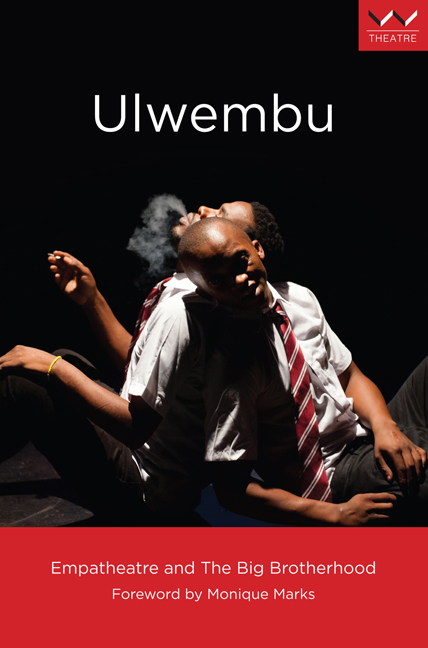Book contents
- Frontmatter
- Dedication
- Contents
- Acknowledgements
- Foreword
- Introduction
- Glossary and translation
- Images from production
- Ulwembu: the play script
- Prologue: Our story
- Scene 1 Behind the police station
- Scene 2 The police station, captain's office
- Scene 3 The school yard
- Scene 4 Portia's house
- Scene 5 Behind Emmanuel's sphaza shop
- Scene 6 Behind Emmanuel's sphaza shop
- Scene 7 The police station
- Scene 8 Emmanuel's sphaza shop
- Scene 9 Outside Emmanuel's sphaza shop
- Scene 10 Outside Emmanuel's sphaza shop
- Scene 11 Portia's house
- Scene 12 Bongani's house
- Scene 13 Outside Emmanuel's sphaza shop
- Scene 14 Outside Emmanuel's sphaza shop
- Scene 15 Bongani's house
- Scene 16 Outside Emmanuel's sphaza shop
- Scene 17 Sipho's room
- Scene 18 Emmanuel's sphaza shop
- Scene 19 Captain's office
- Scene 20 Behind the police station
- Scene 21 Bongani's house
- Scene 22 Portia's house
- Scene 23 Captain's office
- Scene 24 Emmanuel's sphaza shop
- Scene 25 On the street
- Epilogue: Our story
- Notes
- The Authors
Foreword
Published online by Cambridge University Press: 29 May 2019
- Frontmatter
- Dedication
- Contents
- Acknowledgements
- Foreword
- Introduction
- Glossary and translation
- Images from production
- Ulwembu: the play script
- Prologue: Our story
- Scene 1 Behind the police station
- Scene 2 The police station, captain's office
- Scene 3 The school yard
- Scene 4 Portia's house
- Scene 5 Behind Emmanuel's sphaza shop
- Scene 6 Behind Emmanuel's sphaza shop
- Scene 7 The police station
- Scene 8 Emmanuel's sphaza shop
- Scene 9 Outside Emmanuel's sphaza shop
- Scene 10 Outside Emmanuel's sphaza shop
- Scene 11 Portia's house
- Scene 12 Bongani's house
- Scene 13 Outside Emmanuel's sphaza shop
- Scene 14 Outside Emmanuel's sphaza shop
- Scene 15 Bongani's house
- Scene 16 Outside Emmanuel's sphaza shop
- Scene 17 Sipho's room
- Scene 18 Emmanuel's sphaza shop
- Scene 19 Captain's office
- Scene 20 Behind the police station
- Scene 21 Bongani's house
- Scene 22 Portia's house
- Scene 23 Captain's office
- Scene 24 Emmanuel's sphaza shop
- Scene 25 On the street
- Epilogue: Our story
- Notes
- The Authors
Summary
I have never been directly involved in the creative arts. I have, throughout my life, lacked the confidence to view myself as a creative person, although I have come to realise that every person has the capacity to be creative. Not all of us, however, have the skills, talent and knowledge to be able to pull together a powerful production that rivets audiences and assists in making sense of very complex problems.
My personal inadequacies in regard to the creative arts were, in some ways, reinforced, as I became part of, then watched in absolute awe, the production of Ulwembu by the Big Brotherhood community theatre group. This highly skilled group of actors, directed by Neil Coppen and Dylan McGarry, brought to a number of stages (formal and informal) in both KwaZulu-Natal and Gauteng, a theatre production that will not be forgotten by any person who watched it.
Ulwembu, which focuses on the various spiderwebs tangled in the world of street-level drug use, is without doubt, a powerful and deeply researched presentation on the pathways into and out of problematic drug use. The play is situated in Durban, where smoking brown heroin mixed with a number of other (often toxic) compounds has become alarmingly widespread. Whoonga – the street name given to this heroin-based compound – is ubiquitous in Durban and in other parts of the country.
Immediately after using whoonga there is a sense of sedation and hypnotic calm, the withdrawal symptoms related to stopping (or attempting to stop) using are nothing short of horrendous. Nightmares, tremors, sweats, intense head and stomach pain, as well as heightened anxiety, all accompany withdrawal and act as a strong deterrent from abstaining or even reducing use. This horror is brilliantly portrayed in the play, providing the viewer and the reader with critical information about why ‘just stopping’ is an option that is unlikely to work.
But Ulwembu teaches us far more about street-level drug use. Arising out of Big Brotherhood's intensive research, in dialogue with academic scholars, is an intricate map of the many possible factors that give rise to problematic drug use, to being involved in dealing in drugs, to the impact of drug use on families and communities and to the various options that (ideally) exist to reduce the harm associated with drug use.
- Type
- Chapter
- Information
- UlwembuEmpatheatre and the Big Brotherhood, pp. xi - xviPublisher: Wits University PressPrint publication year: 2018



